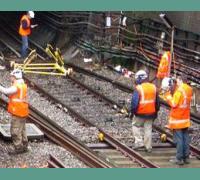RMT announces seven blocks of strike action by tube maintenance staff in fight over safety
Tube union RMT confirmed today that nearly 1500 maintenance and renewals staff on London Underground and Tube Lines will be involved in seven separate blocks of strike action from next Friday, 12th February, in a fight over basic safety issues relating to what are known as “Section 15 possessions”.
The core issue at the heart of the dispute is about safely accessing the track. LU are imposing new track access arrangements called Section 15 Possessions instead of using the current tried and tested Track Access Controllers.
As a result, these moves have led to a casualisation of the access process where professional, computerised systems have been handed over to staff who are undertaking safety related actions from memory with little to no training, no safety critical license and compromising the entire track safety regime. Already we have seen numerous incidents where people have been left at risk from moving trains but the union’s concerns have been ignored and disregarded by an agenda more driven by cost cutting than by desire to make sure workers are safe on the track.
Following a ballot of these key Underground staff, which showed overwhelming support for industrial action, RMT’s National Executive Committee has taken the decision to instruct all members covered by this dispute at LUL and Tubelines NOT TO BOOK ON FOR SHIFTS that commence between:
- 0630 Friday 12th February 2016 and 0629 on Saturday 13th February2016
- 0630 and 1829 on Sunday 6th March 2016
- 0630 Friday 25th March 2016 and 0629 Saturday 26th March 2016
- 0630 Sunday 27th March 2016 and 0629 Monday 28th March 2016
- 0630 and 1829 on Sunday 24th April 2016
- 0630 and 1829 on Sunday 15th May 2016
- 0630 and 1829 on Sunday 12th June 2016
Members have also been instructed to take action short of a strike by doing: no work of any kind in a section 15 possession, and by taking meal breaks as per agreements.
RMT is also currently preparing a ballot of service control staff who are also affected by the compromising of safety resulting from the possessions changes being bulldozed through by London Underground.
RMT general secretary Mick Cash said:
“Nobody should dare to underestimate the severe impact on track safety that the changes bulldozed through by London Underground have unleashed and which have forced our members to take a prolonged period of industrial action to protect both themselves and their colleagues.
“ From a situation where everyone knew how to access the track, we now have anarchy and uncertainty. Into this mix we have engineering train movements that we believe will lead to someone being killed and this union will not sit back and wait for a disaster to happen.
“These ill-conceived and lethal changes to track access must be reversed. RMT remains available for talks.”
- Press releases on this site are taken from www.rmt.org.uk.
- 12174 reads
> RMT National News
- ‹ previous
- 6 of 11
- next ›





